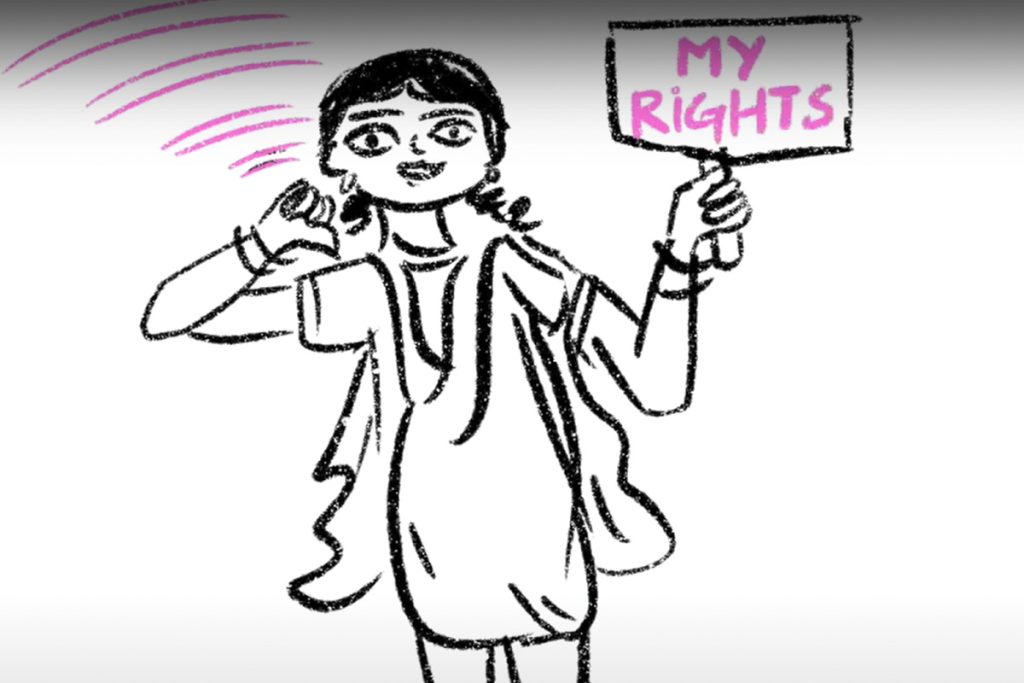Richa

The conversation on sexual and reproductive health rights (SRHR) and access to related services for women, girls, gender-diverse people, people with disabilities, and those at other marginalised intersections of socioeconomic identities, including young people, is heavily influenced by the patriarchal need to control sexuality. Women, girls, trans men, gender-diverse people, and people with disability face high levels of stigma, pressure, and humiliation while seeking SRH services, including abortion services and care. Young people, in particular, experience higher levels of shame and are more susceptible to misinformation. Their access to comprehensive sexuality education is systematically suppressed and denied. These attacks on SRHR put the lives of women, girls, and other marginalised people at great risk while also making them more vulnerable to gender-based violence (GBV). In Sama’s previous engagements with young people on SRHR, concerns and issues related to curtailing young people’s access to SRHR knowledge and resources have come up again and again. Discussions have highlighted that attempts to impose restrictions often result in young people accessing such ‘restricted’ information and services in unsafe ways.
In such a backdrop of structural and systemic lacunae in SRHR, information regarding deliberations over a proposal for a potential ban on the over-the-counter sale of emergency contraceptive pills1https://www.newindianexpress.com/nation/2024/Oct/03/over-the-counter-sale-ban-likely-on-morning-after-pill came to light earlier in October. A sub-committee was formed during the 62nd Drugs Consultative Committee Meeting in September 2023 after the Tamil Nadu government proposed a ban on over-the-counter hormonal contraceptives,2ibid. citing concerns over “irrational usage.” However, soon after the news went around, the Central Drugs Standard Control Organisation (CDSCO), India’s national body for pharmaceutical regulation, assured that there is no plan to move emergency contraceptive pills from over-the-counter to prescription drugs.3https://www.thehindu.com/sci-tech/health/no-proposal-to-move-the-ecp-drugs-from-non-prescription-to-prescription-category-cdsco-clarifies/article68746216.ece/amp/
Access to emergency contraception, including pills for all those who need it, is recognised as a basic human right by international laws, including Articles 1 and 3 of the Convention on the Elimination of All Forms of Discrimination Against Women (CEDAW),4https://www.ohchr.org/sites/default/files/cedaw.pdf the International Conference on Population and Development (ICPD) Programme for Action,5https://www.unfpa.org/sites/default/files/pub-pdf/programme_of_action_Web ENGLISH.pdf and is also part of Sustainable Development Goal (SDG) Indicator 3.7.16https://www.un.org/development/desa/pd/data/sdg-indicator-371-contraceptive-use#:~:text=%E2%80%9CBy%202030%2C%20ensure%20universal%20access,coverage%20for%20family%20planning%20programmes and Indicator 5.6.2,7https://sdg.data.gov/5-6-2/ among others. This access is to be ensured by making these contraceptives readily available over the counter, without any prescription, and free of discrimination or restrictions for anyone. This is a basic and essential healthcare for all women, girls, trans men, and especially survivors of sexual violence.
Any attempt to obstruct access to over-the-counter emergency contraceptive pills is a direct denial of basic health care to those who need it the most. Such an attempt based on myths and misinformation associated with the ‘irrational use’ of emergency contraceptive pills is rooted in misogyny and a patriarchal impulse to control the body and sexuality of women, girls, trans persons, and gender-diverse people.
As per the National Family Health Survey (NFHS-5),8https://dhsprogram.com/pubs/pdf/FR375/FR375.pdf while around 97 per cent of married men (aged 15 to 49) are aware of condom use, less than 10 per cent use condoms. This places a disproportionate burden on women to take care of contraception and manage unexpected pregnancies, with female sterilisation still the most popular method of contraception. Moreover, UNFPA’s State of the World Population Report 20229https://www.unfpa.org/sites/default/files/pub-pdf/EN_SWP22%20report_0.pdf proclaims that 67 per cent of abortions in India are unsafe. In such scenarios, emergency contraceptive pills grant some level of agency to women to manage unplanned pregnancies. Making them prescription-only drugs hinders their ready availability to all those who need them. Any endeavour to alleviate the unfair burden of contraception on women cannot be achieved by restricting their access to emergency contraceptive pills; instead, there is a strong need to strengthen the public health system as well as increase access to comprehensive sexuality education for all.
Furthermore, the health system’s inadequacy in catering to the specific sexual and reproductive health needs of trans, queer, and disabled people, including access to abortion, further marginalises them. Amidst all this, any inclination to consider bans on SRH services is a threat to reproductive justice. With the growing anti-abortion sentiments and activism globally, one is left with fewer hopes but more questions and concerns. How long are we meant to confront the looming threat to people’s bodily autonomy, agency, and SRHR in all marginalised locations, and where does this end?
Richa works with Sama Resource Group for Women & Health. She has been working on themes of GBV and SRHR, particularly looking at the challenges and access of young people. She acknowledges the guidance from Sarojini N to finalise this piece.




